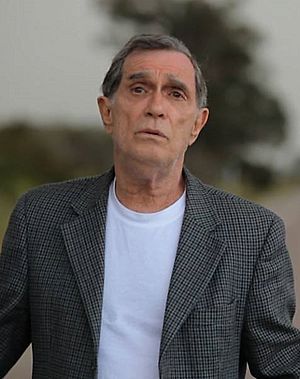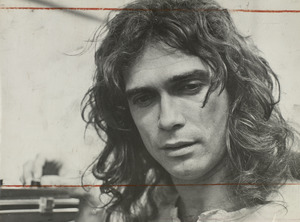Jorge Mautner facts for kids
Quick facts for kids
Jorge Mautner
|
|
|---|---|

Mautner in 2013
|
|
| Born |
Henrique George Mautner
January 17, 1941 Rio de Janeiro, Brazil
|
| Occupation | Singer-songwriter, lyricist, poet, screenwriter |
| Years active | 1962–present |
|
Notable work
|
"Maracatu Atômico" Deus da Chuva e da Morte O Filho do Holocausto |
| Spouse(s) |
Ruth Mendes
(m. 1968) |
| Children | Amora Mautner |
| Awards | Prêmio Jabuti (1963) Latin Grammy Award (2003) |
| Musical career | |
| Genres | MPB |
| Instruments | Vocals, violin |
| Labels | RCA Records, Phonogram Records, PolyGram, Philips Records, Rock Company Records, Primal Records, Universal Music Group, Dabliú Records, Warner Music Group, Deckdisc |
Jorge Mautner (born January 17, 1941) is a Brazilian artist. He is a singer, songwriter, poet, and actor. He also writes lyrics and screenplays. Jorge Mautner helped start the MPB music style and the Tropicalista movement.
Contents
Life and Early Years
Jorge Mautner was born in Rio de Janeiro, Brazil, on January 17, 1941. His parents, Anna and Paul, came to Brazil from Europe. They were escaping the Holocaust, a terrible time when many people were persecuted.
When Jorge was young, his mother became very ill. A kind nanny named Lúcia took care of him. Lúcia introduced Jorge to Candomblé, a religion from Brazil.
In 1948, Jorge's parents divorced. His mother later married Henri Müller, a violinist. Henri taught Jorge how to play the violin. The family moved to São Paulo, where Jorge went to a good school. He was a great student but was expelled for a text he wrote.
Becoming a Writer
Jorge started writing his first book, Deus da Chuva e da Morte, when he was just 15. It was published in 1962 and won an award called the Prêmio Jabuti in 1963. This book was the first part of his Mitologia do Kaos series. This series also includes Kaos (1963) and Narciso em Tarde Cinza (1965). In these books, Mautner shared his ideas for the "Kaos Movement."
Music and Activism
In 1962, Jorge Mautner joined the Brazilian Communist Party. He was invited by a famous scientist, Mário Schenberg.
Facing Challenges
Jorge was arrested during the 1964 Brazilian coup d'état, a time of political change in Brazil. He was later released but had to be careful about what he said. In 1966, he released his first song, "Radioatividade."
Soon after, he traveled to the United States. There, he worked for UNESCO, an organization that promotes peace. He also translated Brazilian books. He met famous poets like Robert Lowell and Paul Goodman, who greatly influenced him.
In 1968, he returned to Brazil for a short time. He worked on a film called Jardim de Guerra as a screenwriter.
Creative Collaborations
In 1970, Jorge went to London and became friends with musicians Gilberto Gil and Caetano Veloso. He then moved back to Rio de Janeiro. He started writing for a funny newspaper called O Pasquim.
That same year, he directed a film called O Demiurgo. Many famous artists, including Gil and Veloso, were in it. However, the film was not widely released because the government censored it. Years later, in 2013, Mautner shared the film on his YouTube channel.
Around this time, he met Nélson Jacobina. They became great songwriting partners. Together, they wrote many songs, including the popular 1974 hit "Maracatu Atômico."
A Special Concert
On December 10, 1973, Mautner was part of a special concert called Banquete dos Mendigos. This show celebrated the 25th anniversary of the Universal Declaration of Human Rights. Many famous Brazilian musicians performed, including Chico Buarque and Milton Nascimento. A live album of the concert was released in 1979.
Later Works and Health
In 2002, Jorge Mautner played violin and sang on a song for the band Metrô. That same year, he released an album with Caetano Veloso called Eu Não Peço Desculpa. This album won a Latin Grammy Award in 2003.
A documentary about Jorge Mautner, called Jorge Mautner: O Filho do Holocausto, came out in 2012. It was based on his autobiography. In 2016, on his 75th birthday, Mautner published his eleventh book, Kaos Total.
On July 28, 2016, Jorge Mautner had a heart attack. He had surgery and recovered well. A month later, he announced he was writing a series of books about his time with the Brazilian Communist Party.
In 2017, Mautner acted in the film Just Like Our Parents. In April 2019, he released a new album called Não Há Abismo em que o Brasil Caiba. One song on the album honored Marielle Franco, an activist. The album was named one of the best Brazilian albums of 2019.
Family Life
In 1968, Jorge Mautner married Ruth Mendes, a historian. They have a daughter named Amora, born in 1975. Amora grew up to become a well-known director of telenovelas, which are popular Brazilian TV shows.
Music Albums
Studio Albums
| Year | Album |
|---|---|
| 1972 | Para Iluminar a Cidade
|
| 1974 | Jorge Mautner
|
| 1976 | Mil e Uma Noites de Bagdá
|
| 1981 | Bomba de Estrelas
|
| 1985 | Antimaldito
|
| 1988 | Árvore da Vida
|
| 1992 | Pedra Bruta
|
| 1997 | Estilhaços de Paixão
|
| 2002 | Eu Não Peço Desculpa
|
| 2007 | Revirão
|
| 2019 | Não Há Abismo em que o Brasil Caiba
|
Compilation Albums
| Year | Album |
|---|---|
| 1999 | O Ser da Tempestade
|
Live Albums
| Year | Album |
|---|---|
| 1979 | O Banquete dos Mendigos
|
| 2014 | Para Detonar a Cidade
|
Singles
| Year | Single | Album |
|---|---|---|
| 1966 | "Radioatividade" | Non-album song |
| 1974 | "Maracatu Atômico" | Jorge Mautner |
Books About Jorge Mautner
- 2004: MORAIS JUNIOR, Luís Carlos de. Proteu ou: A Arte das Transmutações. Leituras, audições e visões da obra de Jorge Mautner
- 2004: Jorge Mautner em movimento (Edited by César Resac)
See also
 In Spanish: Jorge Mautner para niños
In Spanish: Jorge Mautner para niños
 | Jackie Robinson |
 | Jack Johnson |
 | Althea Gibson |
 | Arthur Ashe |
 | Muhammad Ali |


